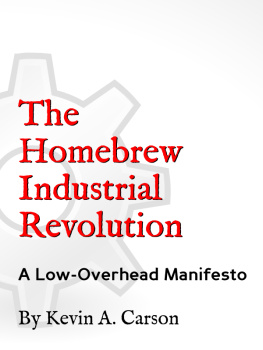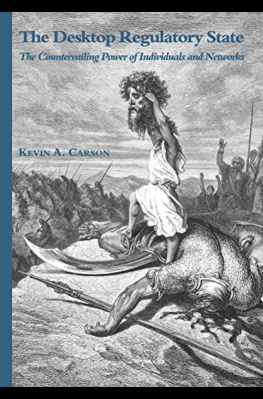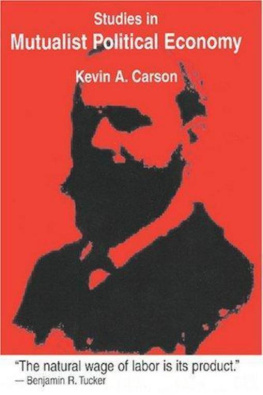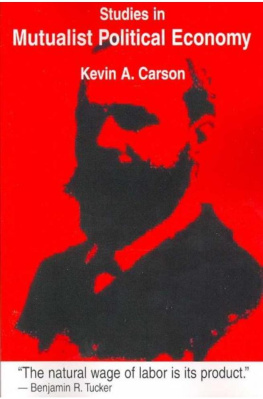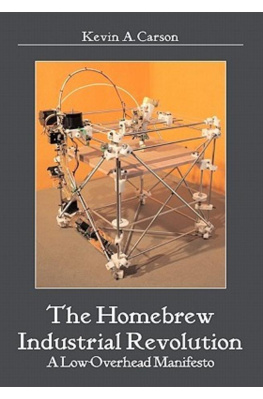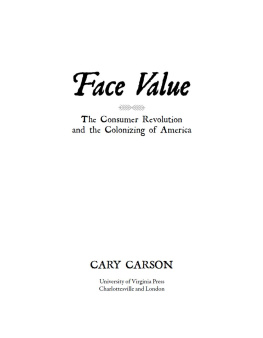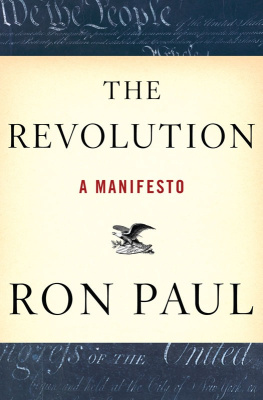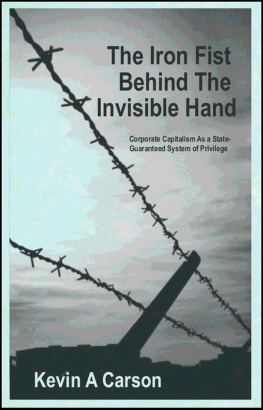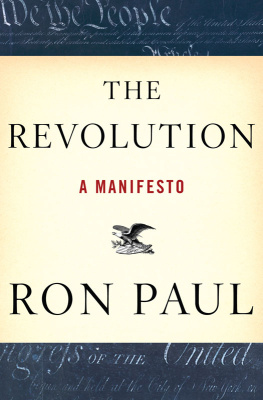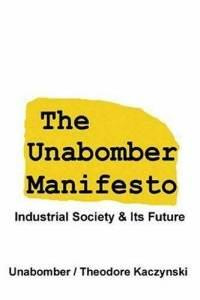Kevin A. Carson - The Homebrew Industrial Revolution: A Low-Overhead Manifesto
Here you can read online Kevin A. Carson - The Homebrew Industrial Revolution: A Low-Overhead Manifesto full text of the book (entire story) in english for free. Download pdf and epub, get meaning, cover and reviews about this ebook. genre: Politics. Description of the work, (preface) as well as reviews are available. Best literature library LitArk.com created for fans of good reading and offers a wide selection of genres:
Romance novel
Science fiction
Adventure
Detective
Science
History
Home and family
Prose
Art
Politics
Computer
Non-fiction
Religion
Business
Children
Humor
Choose a favorite category and find really read worthwhile books. Enjoy immersion in the world of imagination, feel the emotions of the characters or learn something new for yourself, make an fascinating discovery.
- Book:The Homebrew Industrial Revolution: A Low-Overhead Manifesto
- Author:
- Genre:
- Rating:5 / 5
- Favourites:Add to favourites
- Your mark:
- 100
- 1
- 2
- 3
- 4
- 5
The Homebrew Industrial Revolution: A Low-Overhead Manifesto: summary, description and annotation
We offer to read an annotation, description, summary or preface (depends on what the author of the book "The Homebrew Industrial Revolution: A Low-Overhead Manifesto" wrote himself). If you haven't found the necessary information about the book — write in the comments, we will try to find it.
The Homebrew Industrial Revolution: A Low-Overhead Manifesto — read online for free the complete book (whole text) full work
Below is the text of the book, divided by pages. System saving the place of the last page read, allows you to conveniently read the book "The Homebrew Industrial Revolution: A Low-Overhead Manifesto" online for free, without having to search again every time where you left off. Put a bookmark, and you can go to the page where you finished reading at any time.
Font size:
Interval:
Bookmark:
Contents
Part OneBabylon: The Rise and Fall of Sloanist Mass Production
Chapter OneA Wrong Turn, and the Path Not Taken
A. Preface: Mumford's Periodization of Technological History
B. The Neotechnic Phase
C. A Funny Thing Happened on the Way to the Neotechnic Revolution
Chapter TwoMoloch: The Anatomy of Sloanist Mass-Production Industry
Introduction
A. Institutional Forms to Provide Stability
B. Mass Consumption and Push Distribution to Absorb Surplus
C. State Action to Absorb Surplus: Imperialism
D. State Action to Absorb Surplus: State Capitalism
E. Mene, Mene, Tekel, Upharsin (A Critique of Sloanism's Defenders)
F. The Pathologies of Sloanism
G. Mandatory High Overhead
Chapter ThreeBabylon is Fallen
Introduction
A. Resumption of the Crisis of Overaccumulation
B. Resource Crises (Peak Oil)
C. Fiscal Crisis of the State
D. Decay of the Cultural Pseudomorph
E. Failure to Counteract Limits to Capture of Value by Enclosure of the Digital Commons
F. Networked Resistance, Netwar and Asymmetric Warfare Against Corporate Management
Appendix. Three Works on Abundance and Technological Unemployment: A Review Essay
Part TwoZion: The Renaissance of Decentralized Production
Chapter FourBack to the Future
A. Home Manufacture
B. Relocalized Manufacturing
C. New Possibilities for Flexible Manufacturing
Sidebar on Marxist Objections to Non-Capitalist Markets: The Relevance of the Decentralized Industrial Model
Chapter FiveThe Small Workshop, Desktop Manufacturing and Household Microenterprise
A. Neighborhood and Backyard Industry
B. The Desktop Revolution and Peer Production in the Immaterial Sphere
C. The Expansion of the Desktop Revolution and Peer Production into the Physical Realm
1. Open-Source Design: Removal of Proprietary Rents from the Design Stage, and Modular Design.
2. Reduced Transaction Costs of Aggregating Capital.
3. Reduced Capital Outlays for Physical Production.
D. The Microenterprise
Appendix. Case Studies in the Coordination of Networked Fabrication and Open Design
1. Open Source Ecology/Factor e Farm.
2. 100k Garages
3. Assessment
Chapter SixLocal Economies and Resilient Communities
A. Local Economes of Bases of Independence and Buffers Against Economic Turbulence
B. Historical Models of the Resilient Community
C. Resilience, Primary Social Units, and Libertarian Values
D. LETS Systems, Barter Networks, and Community Currencies
E. Community Bootstrapping
F. Contemporary Ideas and Projects
Jeff Vail's Hamlet Economy
Global Ecovillage Networking
The Transition Town Movement
Global Villages
Venture Communism
Decentralized Economic and Social Organization (DESO)
The Triple Alliance
Chapter SevenThe Alternative Economy as a Singularity
A. Networked Production and the Bypassing of Corporate Nodes
B. The Advantages of Value Creation Outside the Cash Nexus
C. More Efficient Extraction of Value from Inputs
D. Seeing Like a Boss
E. The Implications of Reduced Physical Capital Costs
F. Strong Incentives and Reduced Agency Costs
G. Reduced Costs from Supporting Rentiers and Other Useless Eaters
H. The Stigmergic Non-Revolution
I. The Singularity
Conclusion
Appendix. The Singularity in the Third World
Bibliography
DEDICATION:
To my mother, Ruth Emma Rickert, and the memory of my father, Amos Morgan Carson.
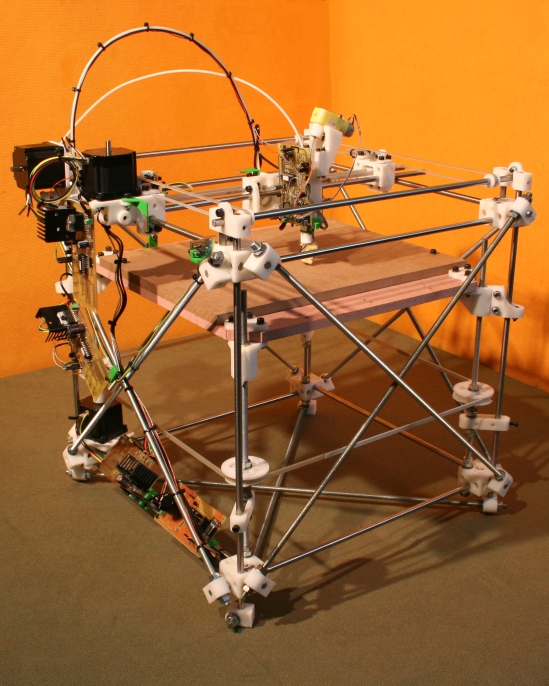
I n researching and writing my last book, Organization Theory: A Libertarian Perspective , I was probably more engaged and enthusiastic about working on material related to micromanufacturing, the microenterprise, the informal economy, and the singularity resulting from them, than on just about any other part of the book. When the book went to press, I didn't feel that I was done writing about those things. As I completed that book, I was focused on several themes that, while they recurred throughout the book, were imperfectly tied together and developed.
In my first paper as research associate at Center for a Stateless Society, And as I wrote those papers, I began to see them as the building blocks for a stand-alone book.
One of the implicit themes in Organization Theory which I have attempted to develop since, and which is central to this book, is the central role of fixed costsinitial capital outlays and other overheadin economics. The higher the fixed costs of an enterprise, the larger the income stream required to service them. That's as true for the household microenterprise, and for the enterprise of the household itself, as for more conventional businesses. Regulations that impose artificial capitalization and other overhead costs, the purchase of unnecessarily expensive equipment of a sort that requires large batch production to amortize, the use of stand-alone buildings, etc., increase the size of the minimum revenue stream required to stay in business, and effectively rule out part-time or intermittent self-employment. When such restrictions impose artificially high fixed costs on the means of basic subsistence (housing and feeding oneself, etc.), their effect is to make cheap and comfortable subsistence impossible, and to mandate ongoing external sources of income just to survive. As Charles Johnson has argued,
If it is true (as Kevin has argued, and as I argued in Scratching By
On the other hand, innovation in the technologies of small-scale production and of daily living reduce the worker's need for a continuing income stream. It enables the microenterprise to function intermittently and to enter the market incrementally, with no overhead to be serviced when business is slow. The result is enterprises that are lean and agile, and can survive long periods of slow business, at virtually no cost; likewise, such increased efficiencies, by minimizing the ongoing income stream required for comfortable subsistence, have the same liberating effect on ordinary people that access to land on the common did for their ancestors three hundred years ago.
The more I thought about it, the more central the concept of overhead became to my analysis of the two competing economies. Along with setup time, fixed costs and overhead are central to the difference between agility and its lack. Hence the subtitle of this book: A Low Overhead Manifesto.
Agility and resilience are at the heart of the alternative economy's differences with its conventional predecessor. Its superiorities are summed up by a photograph I found at Wikimedia Commons, which I considered using as a cover image; a tiny teenage Viet Cong girl leading an enormous captured American soldier. I'm obliged to Jerry Brown (via Reason magazine's Jesse Walker) for the metaphor: guerrillas in black pajamas, starting out with captured Japanese and French arms, with a bicycle-based supply train, kicking the living shit out of the best-trained and highest-technology military force in human history.
But Governor Brown was much more of a fiscal conservative than Governor Reagan, even if he made arguments for austerity that the Republican would never use. (At one point, to get across the idea that a lean organization could outperform a bloated bureaucracy, he offered the example of the Viet Cong.)
I since decided to go with the picture of the Rep-Rap 3-D printer which you see at the beginning of this preface now, but a guerrilla soldier is still an appropriate symbol for all the characteristics of the alternative economy I'm trying to get across. As I write in the concluding chapter of the book:
Next pageFont size:
Interval:
Bookmark:
Similar books «The Homebrew Industrial Revolution: A Low-Overhead Manifesto»
Look at similar books to The Homebrew Industrial Revolution: A Low-Overhead Manifesto. We have selected literature similar in name and meaning in the hope of providing readers with more options to find new, interesting, not yet read works.
Discussion, reviews of the book The Homebrew Industrial Revolution: A Low-Overhead Manifesto and just readers' own opinions. Leave your comments, write what you think about the work, its meaning or the main characters. Specify what exactly you liked and what you didn't like, and why you think so.

